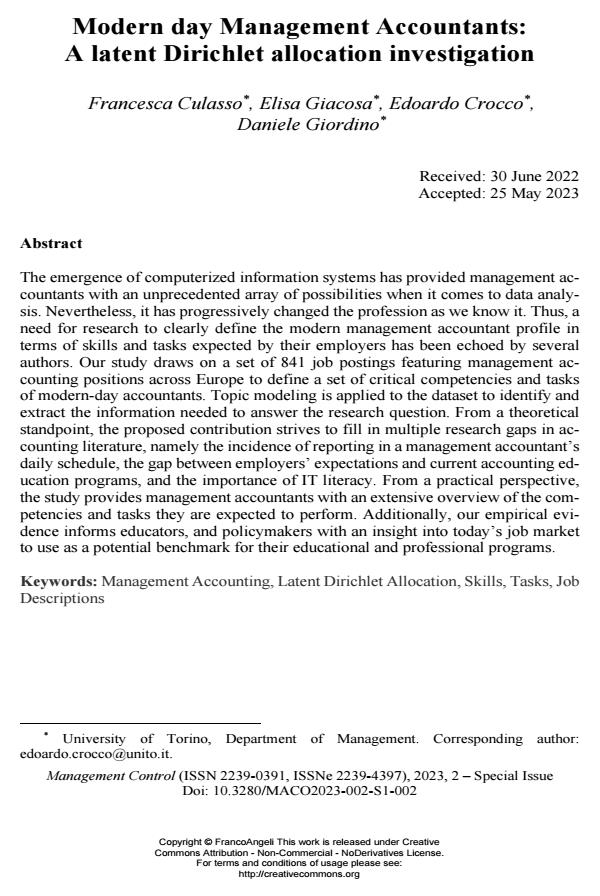Modern day Management Accountants: A latent Dirichlet allocation investigation
Titolo Rivista MANAGEMENT CONTROL
Autori/Curatori Francesca Culasso, Elisa Giacosa, Edoardo Crocco, Daniele Giordino
Anno di pubblicazione 2023 Fascicolo 2023/2 Suppl.
Lingua Inglese Numero pagine 26 P. 11-36 Dimensione file 401 KB
DOI 10.3280/MACO2023-002-S1002
Il DOI è il codice a barre della proprietà intellettuale: per saperne di più
clicca qui

FrancoAngeli è membro della Publishers International Linking Association, Inc (PILA), associazione indipendente e non profit per facilitare (attraverso i servizi tecnologici implementati da CrossRef.org) l’accesso degli studiosi ai contenuti digitali nelle pubblicazioni professionali e scientifiche.
The emergence of computerized information systems has provided management accountants with an unprecedented array of possibilities when it comes to data analysis. Nevertheless, it has progressively changed the profession as we know it. Thus, a need for research to clearly define the modern management accountant profile in terms of skills and tasks expected by their employers has been echoed by several authors. Our study draws on a set of 841 job postings featuring manage-ment accounting positions across Europe to define a set of critical competencies and tasks of modern-day accountants. Topic modeling is applied to the dataset to identify and extract the information needed to answer the research question. From a theoretical standpoint, the proposed contribution strives to fill in multiple re-search gaps in accounting literature, namely the incidence of reporting in a man-agement accountant’s daily schedule, the gap between employers’ expectations and current accounting education programs, and the importance of IT literacy. From a practical perspective, the study provides management accountants with an extensive overview of the competencies and tasks they are expected to perform. Additionally, our empirical evidence informs educators, and policymakers with an insight into today’s job market to use as a potential benchmark for their educa-tional and professional programs.
Parole chiave:Management Accounting, Latent Dirichlet Allocation, Skills, Tasks, Job Descriptions
Francesca Culasso, Elisa Giacosa, Edoardo Crocco, Daniele Giordino, Modern day Management Accountants: A latent Dirichlet allocation investigation in "MANAGEMENT CONTROL" 2 Suppl./2023, pp 11-36, DOI: 10.3280/MACO2023-002-S1002